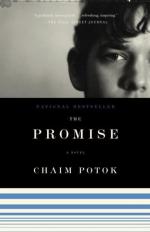
|
| Name: _________________________ | Period: ___________________ |
This test consists of 5 short answer questions, 10 short essay questions, and 1 (of 3) essay topics.
Short Answer Questions
1. Against what does Kalman fight?
2. What is the setting at the opening to Chapter 8?
3. What does Reuven continue to do with Rav Kalman?
4. What do the teachers at Professor Gordon's school think about David Malter's book?
5. Who has been upset by Rav Kalman's article on David Malter's book?
Short Essay Questions
1. What does Michael do when Reuven says he is going inside because he is cold?
2. What is the difference in scholarly approaches between Kalman and Reuven's father.
3. What does Danny give Michael and what does Michael say about it to Reuven?
4. What happens when Reuven goes in to Michael's room to see him after the fire?
5. How is David Malter's recent book release still affecting the community?
6. Describe the altercation between Kalman and Greenfield.
7. What explanation does Kalman offer for his attack on Greenfield the day before in class?
8. What does Danny's father want to learn and what is his reaction when Reuven tells him?
9. What does Danny think about isolation and what does Danny want Reuven to do?
10. What does Michael say about Rav Kalman's article?
Essay Topics
Write an essay for ONE of the following topics:
Essay Topic 1
Oftentimes, a book is more of a character-driven plot rather than action driven, and oftentimes the other way. Some books seem to balance the two. Discuss the following:
1. What do you think it means to say that a plot is character driven? Action driven?
2. How do you think a plot differs if it is character driven versus action driven?
3. Which type of plot do you find more interesting? Why?
4. Do you think it is possible to have a plot where action and character development share equal time? Why or why not.
5. What type of plot do you think The Promise is? Explain your response.
Essay Topic 2
In Chapter 4, David Malter is impressed that Gordon has a theology where Jews can fail to believe but remain observant. Discuss the following:
1. Why do you think Jews who do not believe in God would want to still observe the religious rituals surrounding the Jewish religious beliefs?
2. Discuss the advantages and disadvantages of following the outward form without the inner beliefs.
3. Do you think it is a common practice for a person to follow the outward trappings of his/her religion (whether Judaism, Christianity, Islam, Hindu, etc...) but not actually believe?
4. If you no longer believed in the spiritual/theological ideas behind the outward practice of your religion, would you continue to participate in the ceremonies that are a part of your belief system? Why or why not.
Essay Topic 3
In Chapter 11, Reuven is in Kalman's class, but their encounter is brief. Kalman says nothing to Reuven and Reuven feels hatred for him. Discuss the following:
1. Do you think Reuven's hatred for Kalman is justified?
2. Can this difference of ideology between Kalman and Reuven be a metaphor for the differences between any two people/groups/nations that have ideological differences? Explain fully.
3. Why do you think most people want others to believe the way they do? Is this healthy? Does it contribute to peace or conflict?
|
This section contains 1,179 words (approx. 4 pages at 300 words per page) |

|




